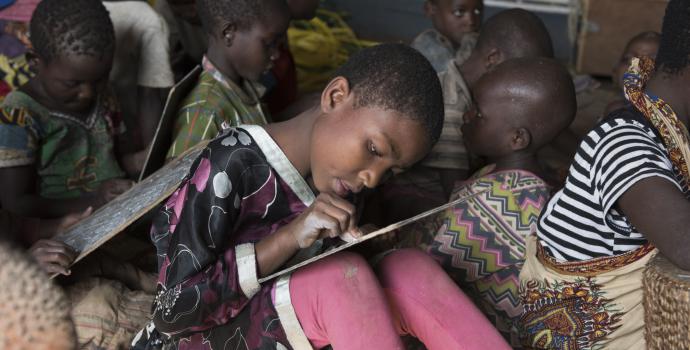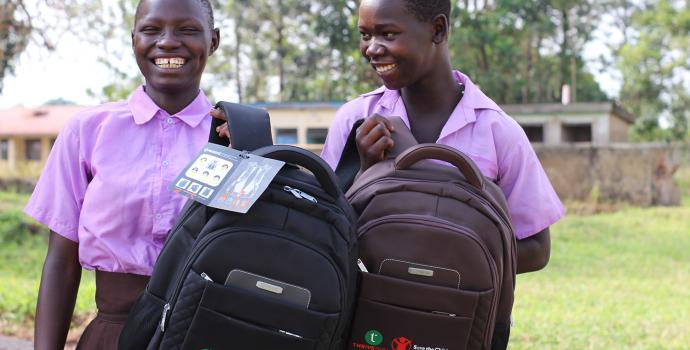10 reasons to support Uganda's new Education Response Plan

A joint statement endorsed by:
Adventist Development and Relief Agency (ADRA); AVSI; BRAC; CARE; Danish Refugee Council (DRC); Finn Church Aid (FCA); Food for the Hungry; Humanity & Inclusion; Norwegian Refugee Council (NRC); Oxfam; Plan International; Save the Children; VSO; War Child Holland; Windle International Uganda; World Vision; ZOA
The launch of Uganda’s new Education Response Plan for Refugees and Host Communities (ERP) is an opportunity to ensure a better future for hundreds of thousands of children.
The Plan – the first of its kind worldwide – represents a huge policy step forward for refugee education. It sets out a realistic and coordinated plan to ensure quality, accredited education for refugees and host communities within a national education system on a multi-year basis. It demonstrates that universal schooling in a refugee crisis is both affordable and achievable, if the international community acts decisively.
As organizations responding to the refugee crisis in Uganda, we see countless children forced to drop out of school; crumbling and overcrowded classrooms; schools without buildings or safe water and sanitation; and pupils having to walk miles to and from school every day. What shines through is children’s desire to learn and build a better future for themselves and their communities.
The ERP shows how an average of 567,500 learners per year can be reached with improved education services, at a total cost of $389 million over 3.5 years. While the Plan sets out the ambition and concrete steps to achieve this, it now needs to be funded and implemented.
The global response to the unprecedented movement of refugees has to date been inadequate. This is an opportunity to turn global commitments into action. We therefore call on donors to provide the funding needed to make this Plan a reality.
10 reasons why the international community must support the Plan:
- The scale of need is enormous. Uganda is hosting the largest number of refugees in Africa and more continue to arrive, fleeing horrific violence in eastern Democratic Republic of Congo and South Sudan. More than 130,000 new refugees have arrived so far this year alone, 60% of them children. More than half of all refugee children in Uganda (57%) are out of school – many of them for several years. Even for those who are able to attend school, the quality of education is severely compromised by a shortage of classrooms, teachers and materials. Class sizes average more than 150 children, with some squeezing in 250 children or more. Dozens of temporary school structures are at risk of collapse but there are no funds for repairs, while newly-built learning centres for new arrivals remain closed as there are no funds to open them and provide teachers. Children with disabilities face additional barriers to attending school, such as lack of assistive devices and stigma, and need adapted measures.
- The 12 districts hosting this mass influx of refugees include some of the poorest and least developed areas in Uganda. Local communities have shown great generosity and solidarity in welcoming refugees, but services are severely overstretched. More than one-third (34%) of Ugandan children in refugee-hosting communities are out of school, while many have to walk for miles to and from class. The ERP recognises that these often-neglected communities need much more support, and sets out services to benefit all children in need.
- The Government of Uganda is showing global leadership in refugee policy and how we respond to refugee crises, yet the international community is not living up to its commitments to share the responsibility. Uganda has granted refugees access to land and services, freedom of movement, and the right to work. However, despite commitments in the New York Declaration for Refugees and Migrants in 2016, and the Global Compact for Refugees – Programme of Action, the refugee response remains critically underfunded. Where funding has been made available, it is largely short-term and unsuitable for the chronic long-term needs of a protracted crisis.
- What happens next in Uganda will determine the whole international framework for refugee crises. Uganda and the ERP is a test case for the willingness of the international community to back their commitments with practical actions, and ensure that the responsibility of responding to the refugee crisis is shared fairly. Uganda is playing a crucial pilot role in the Comprehensive Refugee Response Framework (CRRF), which was adopted as part of the New York Declaration by all 193 UN Member States, to better integrate humanitarian action into wider strategies for recovery and rebuilding. Since then Uganda has made significant progress, but financing to make plans a reality has failed to materialise. Other countries that are hosting large refugee populations, or may do in future, are looking at how the world responds to Uganda’s request for support.
- If supported, the ERP can also provide an example to refugee responses worldwide. It is the first of its kind and serves as a model to develop similar plans in other sectors in Uganda – with similar processes in the sectors of health, and water and environment, now underway – as well as in other countries around the globe.
- The ERP represents a paradigm shift from a mainly humanitarian focus to a sustainable, integrated approach that addresses both an immediate humanitarian crisis response as well as medium and long-term investments towards recovery and development. It advocates for predictable and sustainable financing for this emergency and protracted crisis.
- The Plan has been designed through wide consultation and coordination. Globally, the refugee education response suffers from chronic under-funding, highly-fragmented and poorly coordinated planning, and institutionalised short-termism. The ERP is led by the Government of Uganda, ensuring long-term sustainability, but it has been developed in close collaboration and coordination with all stakeholders and education actors. This has helped to overcome the fragmented approach seen in so many contexts, and enabled a more joined up, transparent and harmonized approach to the crisis. It is closely aligned with the Government’s existing Education Sector Strategic Plan (2017-2020) and the Sustainable Development Goals.
- The ERP is designed to be a three-year rolling plan with opportunities to assess lessons learned and challenges to make it as effective as possible. As NGOs working in Uganda, we hope that the next revisions will put greater emphasis on pre-primary education and Early Childhood Development (ECD), as there is no single greater indicator of future academic and life success. Currently only 19% of host community children and 39% of refugee children are enrolled in ECD, and we are concerned this will decline further due to lack of funding for ECD in the refugee response.
- The process to develop the plan has already inspired new ways of working and built momentum on the ground that must not be lost. Thanks to early Education Cannot Wait funding, initiatives are under way to catalyse key components of the plan – such as civil society and government working together to develop common guidelines and curricula for accelerated education, and a collective effort to ensure accreditation of refugee teachers.
- Investing in education is vital for ensuring that refugee children from some of the world’s worst conflicts are given the best possible chance of a future and to contribute to building a prosperous and peaceful society. Education is not only a human right; it protects children from child labour and exploitation, including saving girls from early and forced marriages. It helps children cope with the trauma and psychological wounds of their experiences, and empowers them to live productive, fulfilling and independent lives. An entire generation is at stake.




